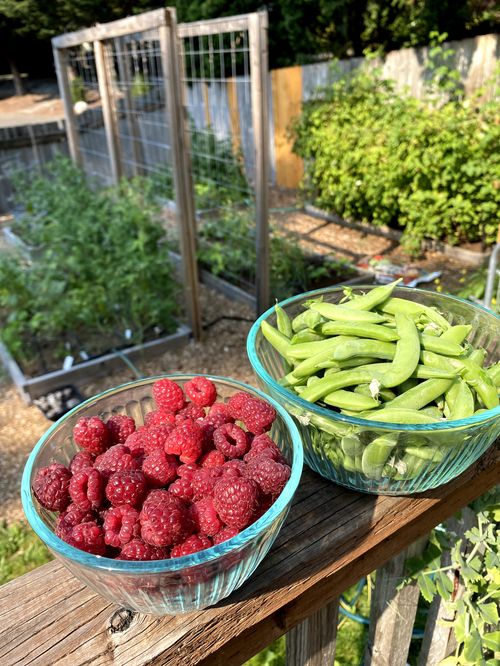Stewarding Your Time
BEN SANSBURN

THE TRELLIS & THE VINE
In the spring of 2020 we expanded our backyard vegetable garden. It was our big "COVID-quarantine" project. (Apparently it was everyone else's too).
We added two more 4’ x 8’ garden boxes. We installed an automated watering system. We planted raspberries (undoubtedly the best part of the garden, in my opinion). But the part of the project that took the most effort was building two 7’ high trellises on the side of each of our two large garden boxes. It was also the part of the project that was the most fruitful.
You see, gardens can get unwieldy quick. Vine plants like beans, tomatoes, zucchini - those don’t do well if they’re left to just try and find their way along the ground in and amongst other plants. They don’t have space to grow. They don’t get the sun they need. And in a cramped garden, they’ll get choked out. But if you tend them, and give them space and a structure to grow on, they’ll give you a harvest.
You see, gardens can get unwieldy quick. Vine plants like beans, tomatoes, zucchini - those don’t do well if they’re left to just try and find their way along the ground in and amongst other plants. They don’t have space to grow. They don’t get the sun they need. And in a cramped garden, they’ll get choked out. But if you tend them, and give them space and a structure to grow on, they’ll give you a harvest.

Our lives are a lot like that. Without space and structure, without a trellis to grow on, our lives will have a difficult time flourishing. They’ll feel scattered and tangled, crowded with busyness and hurry. But with the right trellis the vine of our lives has room to stretch out. A support structure gives us what we need to grow and expand and bear fruit.
In ancient monastic communities that structure was called a “rule of life.” An ordered rhythm to the days and weeks that gave consistency and prioritized what leads to spiritual health. Others have called these rhythms and practices “spiritual disciplines,” or “rhythms of grace.” It really doesn’t matter the term you use, what we’re talking about are the consistent, stable habits that facilitate spiritual vitality in your everyday life. Some of those things might be obviously ‘spiritual’ like Bible reading, prayer, and gathering with God’s people. Others we might think of as less ‘spiritual,’ but are no less important. Physical exercise, good sleep, and intentional family time come to mind. Each of these, and other practices, form a stable trellis we can grow and bear fruit on.
For some of us, that trellis is already in place. Others need some repairs. And for some of us it’s never been built. There can be a challenge if your life isn’t growing up the trellis. Getting there may require some pruning. Cutting some parts out of the tangled, cramped confines of the garden bed, in order to train the vine up the trellis. That pruning may be painful, but it’s needed. In fact, all of us would benefit through considering what needs to be cut out of our lives so the rest of the vine thrives.
But the trellis is key. John Mark Comer, in his book The Ruthless Elimination of Hurry puts it starkly:
In ancient monastic communities that structure was called a “rule of life.” An ordered rhythm to the days and weeks that gave consistency and prioritized what leads to spiritual health. Others have called these rhythms and practices “spiritual disciplines,” or “rhythms of grace.” It really doesn’t matter the term you use, what we’re talking about are the consistent, stable habits that facilitate spiritual vitality in your everyday life. Some of those things might be obviously ‘spiritual’ like Bible reading, prayer, and gathering with God’s people. Others we might think of as less ‘spiritual,’ but are no less important. Physical exercise, good sleep, and intentional family time come to mind. Each of these, and other practices, form a stable trellis we can grow and bear fruit on.
For some of us, that trellis is already in place. Others need some repairs. And for some of us it’s never been built. There can be a challenge if your life isn’t growing up the trellis. Getting there may require some pruning. Cutting some parts out of the tangled, cramped confines of the garden bed, in order to train the vine up the trellis. That pruning may be painful, but it’s needed. In fact, all of us would benefit through considering what needs to be cut out of our lives so the rest of the vine thrives.
But the trellis is key. John Mark Comer, in his book The Ruthless Elimination of Hurry puts it starkly:
“If a vine doesn’t have a trellis, it will die. And if your life with Jesus doesn’t have some kind of structure to facilitate health and growth, it will wither away. Following Jesus has to make it onto your schedule and into your practices or it will simply never happen.”
Let’s not wait until the next COVID quarantine to work on the gardens of our lives. Instead, as 2022 begins we can put in place solid trellises that will enable all kinds of life to sprout up everywhere we look.
The Importance of the Church
Living deeply embedded in the life of the church needs to be a significant part of each of our trellises. And in a increasingly disconnected, digital, self-centered world, we need what life in God’s community can do to us.
In his helpful book The Wisdom Pyramid, Brett McCracken says this:
In his helpful book The Wisdom Pyramid, Brett McCracken says this:
“The weekly rituals of church worship orient our lives around God and his wisdom. When every moment of our iWorld existence conditions us to celebrate thee self, the church boldly celebrates something bigger and grander and more compelling. In an Agee of nauseating narcissism where everyone clamors for stardom and Instagram likes, the church humbles us and weekly reminds us: this is not about you. This is about God. You are welcome here, you are wanted, your presence in the body is important. You are part of the story. But God is the star, not you. What a freeing and wonderful thing.”
Questions for Self-Reflection
- Take some time this week to do a ‘time audit’ of your life using a resource like this. Ask yourself the hard questions. If somewhere were to look at the way you use your time, what would they think are your priorities? Where are you wasting time? What could be cut out that is not necessary?
- How’s your trellis? In the past, what practices and rhythms have facilitated spiritual vitality for you? What would it look like to constantly integrate those into your life?
- What changes is God prompting you to make in the way you are using technology - your phone, tablet, social media, entertainment consumption?
- Are you prioritizing what is most important in the way you use your time? Are God, your family, and your church community getting the first and best of your time, or the leftovers of it?
- Who is God calling you to love and serve with your time in this season?
Prayer Points
- Ask God to shine his gracious light on the areas of your time management that need to change. Remember the freedom of the gospel as you repent of areas you’ve been prioritizing the wrong things.
- Rehearse God’s grace toward you through the gospel. Remember that you are not justified through your time management, or productivity, or efficiency, but through the cross of Christ. It’s Jesus’ death and resurrection that enables you to admit your failures and empowers you to change the things that need to be changed.
- Pray that God would lead in conversations you need to have with your spouse, your family, or your community about how you use your time.
A Prayer from The Valley of Vision
HEAVENLY FATHER,
Thou hast placed me in the church
which thy Son purchased by his own blood.
Add grace to grace that I may live worthy of my vocation.
I am a voyager across life’s ocean;
Safe in heaven’s ark, Mary I pass through a troubled world
into the harbor of eternal rest.
I am a tree of the vineyard thou hast planted.
Grant me not to be barren, with worthless leaves and wild grapes;
Prune me of useless branches;
Water me with dews of blessing.
I am part of the Lamb’s bride, the church.
Help me to be true, faithful, chaste, loving, pure, devoted;
Let no strong affection wantonly dally with the world.
May I live high above a love of things temporal,
sanctified, cleansed, unblemished, hallowed by grace,
thy love my fullness,
thy glory my joy,
thy precepts my resting place.
My heart is not always a flame of adoring love,
But, resting in thy Son’s redemption,
I look forward to the days of heaven,
where no languor shall oppress,
no iniquities chill,
no mists of unbelief dim the eye,
no zeal ever tires.
Father, these thoughts are the stay, prop, and comfort of my soul.
Thou hast placed me in the church
which thy Son purchased by his own blood.
Add grace to grace that I may live worthy of my vocation.
I am a voyager across life’s ocean;
Safe in heaven’s ark, Mary I pass through a troubled world
into the harbor of eternal rest.
I am a tree of the vineyard thou hast planted.
Grant me not to be barren, with worthless leaves and wild grapes;
Prune me of useless branches;
Water me with dews of blessing.
I am part of the Lamb’s bride, the church.
Help me to be true, faithful, chaste, loving, pure, devoted;
Let no strong affection wantonly dally with the world.
May I live high above a love of things temporal,
sanctified, cleansed, unblemished, hallowed by grace,
thy love my fullness,
thy glory my joy,
thy precepts my resting place.
My heart is not always a flame of adoring love,
But, resting in thy Son’s redemption,
I look forward to the days of heaven,
where no languor shall oppress,
no iniquities chill,
no mists of unbelief dim the eye,
no zeal ever tires.
Father, these thoughts are the stay, prop, and comfort of my soul.

